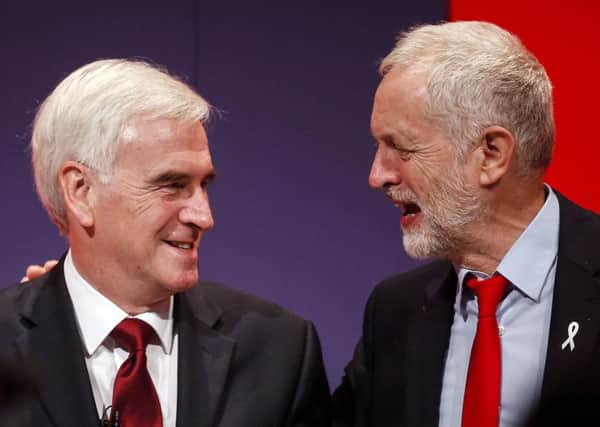Labour '˜intervention' is slated by business leaders


Mr McDonnell told Labour’s conference in Liverpool there would be “no more Philip Greens” if it won the next General Election, in a reference to the former BHS boss, as he promised to make sure company takeovers include plans to pay staff and pensioners.
He repeated his pledge to deliver a £10 living wage and said Government bodies would be given new powers to prevent “national scandals” such as the working conditions exposed at Sports Direct.
Advertisement
Hide AdAdvertisement
Hide AdAnd he said workers at any company facing collapse or closure would have the right to takeover the business.
Mr McDonnell said the next Labour government would be unashamedly “interventionist”.
He said: “We’ll shake up how our major corporations work and change how our economy is owned and managed.
“We’ll clamp down on the abuses of power at the very top. There’ll be no more Philip Greens under Labour and we will legislate to rewrite company law to prevent them.”
Advertisement
Hide AdAdvertisement
Hide AdAs the party continues to try and find a way to overcome its divisions in the aftermath of Jeremy Corbyn’s re-election, his speech was littered with praise for critics of the party leader including Don Valley MP Caroline Flint and leadership challenger Owen Smith.
Mr McDonnell also acknowledged the decision of the Tony Blair-led Labour government to introduce the minimum wage.
“One of the greatest achievements of the government elected in 1997 was the establishment of a national minimum wage, lifting millions out of poverty. The Tories opposed it, claiming it would cost millions of jobs, but - united in purpose - we won the argument.
“Under the next Labour government, everyone will earn enough to live on. When we win the next election we will write a real Living Wage into law. We’ll charge a new Living Wage Review Body with the task of setting it at the level needed for a decent life. Independent forecasts suggest that this will be over £10 per hour. This will be a fundamental part of our new bargain in the workplace,” he said.
Advertisement
Hide AdAdvertisement
Hide AdBut there was also a dig at the direction of the party under Mr Blair and Gordon Brown as he said: “In this party you no longer have to whisper it, it’s called Socialism.”
Mr McDonnell used his speech to try and clarify Labour’s position on the Brexit-talks after Mr Corbyn cast doubt on the party’s commitment to remaining in the European single market.
The shadow chancellor told the conference: “Let’s get it straight, we have to protect jobs here.
“So we will seek to preserve access to the Single Market for goods and services. Today, access to the Single Market requires freedom of movement of labour.
Advertisement
Hide AdAdvertisement
Hide Ad“But we will address the concerns that people have raised in the undercutting of wages and conditions, and the pressure on local public services.”
Mr McDonnell’s broadside against business prompted warnings from the private sector that excessive regulation could have damaging consequences for the economy.
Dr Adam Marshall, acting director general of the British Chambers of Commerce, said: “John McDonnell talks of an ‘interventionist’ future Labour government, but needs to remember that there’s both good intervention and bad intervention.
“Good intervention creates the conditions for all businesses to thrive, but bad intervention ensnares them in red tape and makes them less inclined to employ, train or invest.”
Advertisement
Hide AdAdvertisement
Hide AdCBI director-general Carolyn Fairburn welcomed Labour’s commitment to seek access to the single market as part of the EU negotiations.
She added: “However, the headlines created by a few irresponsible companies do not apply to the vast majority, which are focused on seizing investment opportunities to grow, creating new jobs, and supporting skills development.
“Business contributes £185 billion in taxes to the exchequer, 29 per cent of the total tax take, which helps pay for vital public services, like hospitals and schools.”